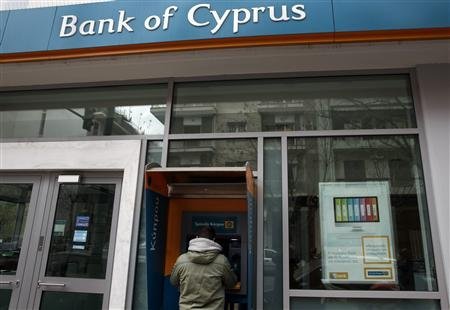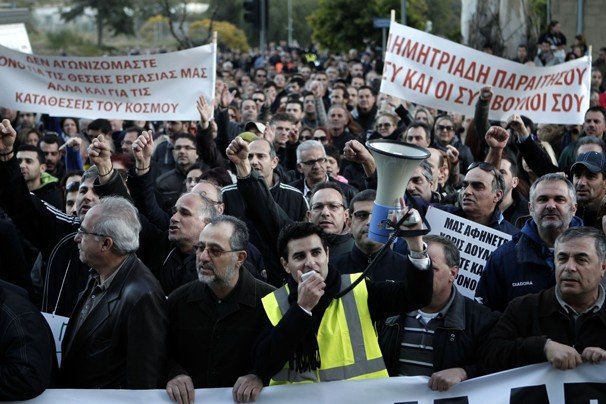Home Tags Posts tagged with "cypriot economy"
cypriot economy
Cyprus is to ease its citizenship rules for foreign investors who lost at least 3 million euros under the European Union bailout deal.
Cypriot President Nicos Anastasiades said new measures, mostly affecting the Russian business community, would be approved at a cabinet meeting on Monday.
Russians have billions of euros in Cyprus’ bank deposits.
Investors were angered when it emerged they would lose up to 60% of their savings under the terms of the bailout.
In order to secure the 10 billion euros bailout, agreed by the EU and IMF, Cyprus was forced to wind up one major bank and write-off of a large portion of secured debt and uninsured deposits in the largest bank, Bank of Cyprus.

Cyprus is to ease its citizenship rules for foreign investors who lost at least 3 million euros under the EU bailout deal
Speaking at a Russian business conference in the coastal resort of Limassol, Nicos Anastasiades said the new measures would “mitigate to some extent the damage” Russian investors had endured.
Cyprus has been a member of the EU since 2004. The country sealed the EU bailout last month to save it from bankruptcy.
Nicos Anastasiades said foreign investors who held deposits prior to March 15, and who lost at least 3 million euros would be eligible to apply for Cypriot citizenship.
Cyprus’s existing “citizenship by investment” programme will also be revised to reduce the amount of investment required to be eligible from 10 million euros to 3 million.
Nicos Anastasiades said he would also drop requirements for citizenship applicants to keep 15 million euros in Cypriot banks for five years, saying they would be allowed immediate access to their money.
“These decisions will be deployed in a fast-track manner,” he said.
The Cypriot economy is worth about 18 billion euros, which accounts for less than 0.2% of the eurozone total.
According to a draft document prepared by Cyprus’ creditors, the cost of the bailout for the country has increased to 23 billion euros ($30 billion).
The original cost of Cyprus bailout was put at 17.5 billion euros.
The new total, disclosed in a document seen by news agencies, means Cyprus will have to find 13 billion euros to secure 10 billion euros from the EU and the IMF.
Previously it was thought that Cyprus would have to raise 7.5 billion euros.

A draft document prepared by Cyprus’ creditors shows that the country’s bailout cost has increased to 23 billion euros
Government spokesman Christos Stylianides said: “It’s a fact the memorandum of November talked about 17.5 billion [euros] in financing needs. And it has emerged this figure has become 23 billion.”
“Who is responsible for this? How did we get here? It was the fear of responsibility and indecision of the previous government,” he added.
Analysts are now questioning if Cyprus can raise such a sum.
The winding up of one Cypriot bank, Laiki (Popular), and the writing-off of a large portion of secured debt and uninsured deposits in the largest bank, Bank of Cyprus, should raise a total of 10.6 billion euros.
Cyprus is also set to sell off a large portion of its gold reserves, in a move that will raise another 400 million euros.
“The sheer size of the increase has underlined the extent of the enormous challenges facing Cyprus itself,” said Jonathan Loynes of Capital Economics in an analyst note.
The Cypriot economy is only worth about 18 billion euros and accounts for less than 0.2% of the eurozone total. Several analysts now think the Cypriot economy may shrink by more than 10% this year alone.
“If everything goes according to plan, the growth figures might at least be in a realistic range, if too optimistic,” said Christoph Weil of Germany’s Commerzbank.
“If there are any problems, and there are significant downside risks, then it could be much worse, and a combined contraction of 20% is within the range of the possible.”
Cyprus has decided to sell off much of its gold reserves to help finance part of its bailout.
An assessment by the European Commission says Cyprus must sell about 400 million euros worth of gold.
Cyprus has already been forced to wind down one of its largest banks in order to qualify for a 10 billion euro lifeline from international lenders.
Even with that bailout, it is predicted that the Cypriot economy will shrink by 8.7% this year.
Cyprus’s total bullion reserves stood at 13.9 tonnes at the end of February, according to data from the World Gold Council.

Cyprus has decided to sell off much of its gold reserves to help finance part of its bailout
At current prices, 400 million euros’ worth of gold amounts to about 10.36 tonnes of metal.
The sale will be the biggest bullion sale by a eurozone central bank since France sold 17.4 tonnes in the first half of 2009.
European finance ministers meet in Dublin on Friday to discuss the Cyprus bailout.
Analysts say it is very unlikely that other EU states will become big sellers of the precious metal.
Portugal holds 382.5 tonnes of gold, worth some 14.76 billion euros at current prices, in its reserves, while Spain’s holdings stand at 281.6 tonnes, worth 10.8 billion euros.
Italy is the world’s fourth-largest gold holder, with 2,451.8 tonnes, worth 94.6 billion euros.
The Russian government has announced it will not compensate its citizens who have lost money in the Cyprus banking crisis.
Russian citizens are believed to have billions of euros in Cypriot accounts and deposits above 100,000 euros ($128,200) in the two biggest banks (Bank of Cyprus and Laiki) could be reduced by as much as 60%.

The Russian government has announced it will not compensate its citizens who have lost money in the Cyprus banking crisis
Such losses would be “a great shame”, First Deputy PM Igor Shuvalov said, “but the Russian government won’t take any action in that situation”.
Cyprus now restricts cash withdrawals.
A 10 billion-euro bailout from the EU and IMF – required to keep the debt-laden Cypriot economy afloat – will only be granted if Cyprus itself raises 5.8 billion euros, most of which looks likely to come from depositors with more than 100,000 euros in Bank of Cyprus and Laiki (Popular Bank).
Laiki, the second largest bank, is being wound up and folded into Bank of Cyprus, the biggest bank.
Speaking on the Russian state TV channel Rossiya 1, Igor Shuvalov said Russian money in Cyprus included some that had been taxed and some that had not.
The Russian government would still look at cases where there were “serious losses, involving companies in which the Russian state is a shareholder”, he said. That review would take place in Russia, and “for this it would certainly not be necessary to help the Republic of Cyprus”, Igor Shuvalov added.
Many of the large-scale foreign investors in Cyprus are Russian – and in many cases they have taken advantage of the island’s status as an offshore tax haven. Some politicians have accused Cyprus of acting as a hub for Russian money-laundering – an allegation rejected by Cypriot officials.
After years of large-scale capital flight from Russia there is now a Kremlin drive to repatriate Russian money. The government has introduced tighter monitoring of foreign bank accounts held by Russian state employees.
Bank of Cyprus depositors with more than 100,000 euros could lose up to 60% of their savings as part of the bailout, officials say.
Cyprus’ central bank says 37.5% of holdings over 100,000 euros will become shares.
Up to 22.5% will go into a fund attracting no interest and may be subject to further write-offs.
The other 40% will attract interest – but this will not be paid unless the bank performs well.
The fear is that once the unprecedented capital controls – which are in place for an indefinite time – are lifted, the wealthiest will rush to move their deposits abroad.
Cyprus has become the first eurozone member country to bring in capital controls to prevent a torrent of money leaving the island and credit institutions collapsing.
President Nicos Anastasiades has said the financial situation has been “contained” following the deal.
The president has also stressed that Cyprus has no intention of leaving the euro, stressing that “in no way will we experiment with the future of our country”.
Nicos Anastasiades has won the Cypriot presidential election with 57.5% of the vote.
It was a comfortable victory of the centre-right leader over Communist-backed Stavros Malas on 42.5%. Stavros Malas has conceded victory.
Nicos Anastasiades takes power as Cyprus stands on the brink of bankruptcy, hit by the knock-on effect of Greece’s economic woes.
He favors a quick deal with foreign lenders to finalize a bailout of the Cypriot economy.
“It is a clear and strong mandate for change, for reform, for our country to exit this vicious circle of crisis,” Tasos Mitsopoulos, Nicos Anastasiades’s spokesman, told reporters according to Reuters news agency.
Jubilant supporters of Nicos Anastasiades’s Democratic Rally party waved Greek and Cypriot flags, honked car horns and set off firecrackers in the capital Nicosia as the results came in, said reports.
But Stavros Malas warned his party would be “severe critics of anything that diverts from the interest of the people or the country”, said AFP news agency.
The Cypriot economy is in recession and the state has little money in its accounts.

Nicos Anastasiades has won the Cypriot presidential election with 57.5 percent of the vote
Cyprus first asked the EU for a bailout last July to shore up its banks.
Because of the bailout deal for Greece, and the restructuring of its debts, which saw private bondholders suffer big losses, Cypriot banks lost about 75% of their investments.
However, the Cypriot bailout deal has foundered in protracted negotiations.
The new president will have to finalize a deal with the other 16 countries that use the euro and with the International Monetary Fund (IMF).
Stavros Malas supported a bailout but opposed austerity. Last week’s first round in the presidential election failed to produce a decisive result.
Nicos Anastasiades will aim to exploit massive natural gas finds off Cyprus’s coast, bringing in badly needed income and energy, but risking escalating tensions with Turkey.
He will also be under pressure to reach out to Turkish Cypriots in the north of the island, cut off since Cyprus was formally divided along ethnic lines almost four decades ago.
Who is Nicos Anastasiades?
- 66-year-old lawyer
- A member of parliament since 1981 and leader of his centre-right DISY (the Democratic Rally) party since 1997
- Says he would support austerity measures which would accompany an EU/IMF rescue package, saying the election is about “the survival of the country”
- Heavy smoker known for straight-talking style – sometimes seen as autocratic
- Widely respected despite political humiliation nine years ago when he supported a UN blueprint to reunify the island that was later rejected by the public
[youtube R7uwGjDWjjA]
[youtube qmFNL_tx9fY]





